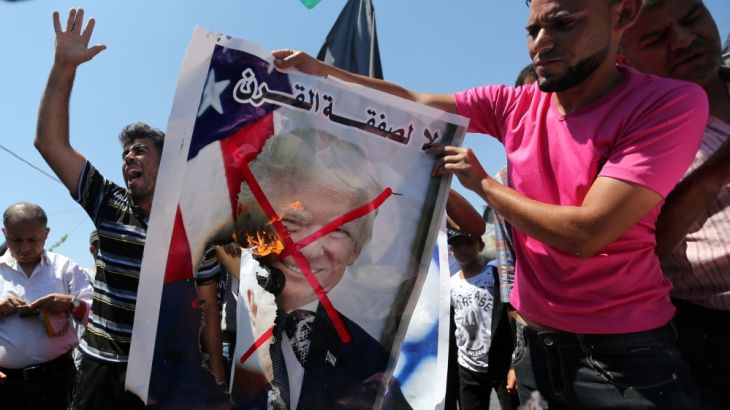‘Divorced from reality’: Palestinians reject US economic plan
US urges Palestinian officials to think outside the ‘traditional box’ after boycott of Bahrain economic workshop.

The US-led economic workshop in Bahrain closed amid derision and rejection from Palestinian officials on Wednesday, who said its framework for a trade and investment boost ignored their political aspirations for statehood.
The two-day workshop, led by White House Senior Adviser Jared Kushner, began on Tuesday in the capital, Manama, and showcased the economic part of the Trump administration’s long-awaited Middle East peace plan.
Keep reading
list of 4 itemsSudan war could lead to more ethnic killings in volatile Darfur region
Why is Iran’s President Ebrahim Raisi visiting Pakistan?
Russia-Ukraine war: List of key events, day 788
Kushner, who is also President Donald Trump‘s son-in-law, urged Palestinian leaders boycotting the event to think outside the “traditional box” and consider the $50bn plan to boost the Palestinian and neighbouring economies, which the United States is hoping the wealthy Gulf states will bankroll.
But the workshop was criticised by Palestinians and others for not addressing the political core of the Israeli-Palestinian conflict.
“The elephant in the room in Manama is obviously the [Israeli] occupation itself,” senior Palestine Liberation Organization (PLO) official Hanan Ashrawi told reporters in the occupied West Bank city of Ramallah, adding that the workshop is “totally divorced from reality”.
Kushner told reporters his team would release the plan’s political details, which remain secret, “when we’re ready”, adding: “We’ll see what happens.”
He said a peace deal would happen when both sides are ready to say “yes”. He acknowledged that they may never get there.
Neither the Israeli nor Palestinian governments attended the meeting, which took place amid a years-long stalemate in other international efforts to resolve a conflict that has lasted more than seven decades.
‘Solution to occupation is not money’
The Peace to Prosperity workshop set an ambitious goal of creating one million new Palestinian jobs through $50bn of investment in infrastructure, tourism and education in the territories and Arab neighbours.
It also proposes a $5bn transport corridor to connect the Palestinian territories of the West Bank and Gaza Strip together.
But Palestinians, according to Al Jazeera’s correspondent Nida Ibrahim, have been adamant in saying that any economic solution should happen in parallel with a political process.
“Palestinians do not see that the solution to their issue is just by money,” Ibrahim said, speaking from Ramallah. “They say they are not looking for a better life under occupation, but are looking for ways to end it.”
Ibrahim said that the Palestinian ambassador to the United Kingdom, Hossam Zomlot, likened the US efforts as a “real estate issue, where the Palestinians will take the cash and Israelis will take the property.”
Analysts have also questioned the logistical aspect of investing a vast amount of money into Palestinian territories under military occupation.
Phyllis Bennis, from the Institute for Policy Studies, told Al Jazeera the proposed plan will “simply not happen”.
“The notion that there is going to be $50bn invested over 10 years in an area of land that is under the complete control of a different government – that is still occupied – where Israel controls everything about the borders, not going to ever happen,” she said.
The proposal, Bennis continued, is not designed to factor in Palestinian rights and self-determination.
“This is designed to divert away from Palestinian rights, to buy off the Palestinians, to urge them to essentially surrender the demand for rights,” she said, adding that the Trump administration has no concern for Palestinian rights.
US ‘punitive measures’ against Palestinians
The PLO has reiterated its rejection of the US economic plan, saying the proposal’s lack of political vision guarantees its failure.
In a statement, the PLO Executive Committee accused the White House of using the workshop as cover for Israel’s efforts to achieve normal relations with Arab states and grow its settlements in the West Bank, adding that peace could not be achieved without ending “Israeli occupation and economic domination”.
Kushner said that the door remained open to the Palestinians to engage in a peace plan as he blamed the leadership of letting down its people.
“If they actually want to make their people’s lives better, we have now laid out a great framework in which they can engage and try to achieve it,” he told reporters.
“What the [Palestinian] leadership has done is that they’ve blamed Israel and everyone else for all the people’s problems, when in fact the common theme coming up is that this is all achievable if the government wants to make these reforms,” he added.
But senior PLO official Ashrawi hit back, asking: “If the US is so concerned about Palestinian well-being, then why did they carry out these punitive measures against us?”
In August last year, Washington announced an end to all US funding for the UN agency that assists Palestinian refugees. The US had been UNRWA’s biggest donor by far up to that point, giving it $364m in 2017.
In February, the US Agency for International Development (USAID) ceased all assistance to the Palestinians, to whom it provided $268m in 2017.
The US cuts were widely seen as a way of putting pressure on the Palestinian leadership to re-engage with the White House, which it has boycotted since Trump recognised Jerusalem as the capital of Israel in 2017.
“The same team that cut $350m of aid to refugee camps … [goes] to Manama to say we have a brilliant plan to bring Palestinians a new chance, a new opportunity,” Chief Palestinian Negotiator Saeb Erekat said on Tuesday.
“Why would Palestinians say no to such [a] plan?” he added, mockingly.